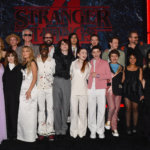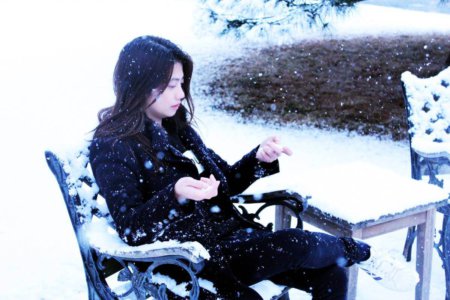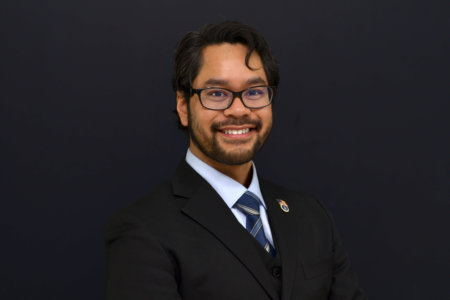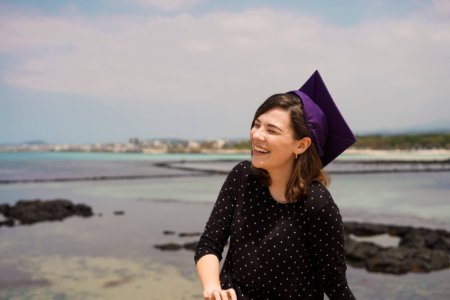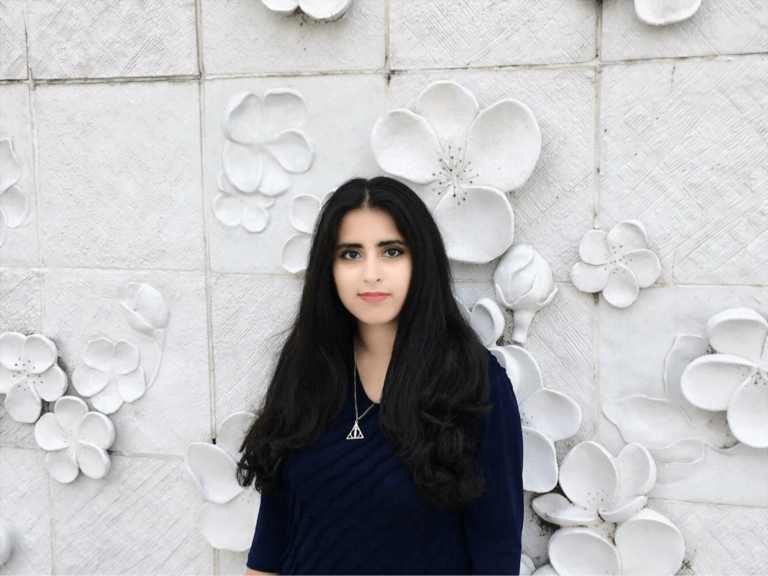
Too young, too risky, too difficult, too expensive — there was always something stopping Ifrah Akhtar from studying abroad. At her freshman year at Rutgers University, however, and after finding a programme that would support her personal, cultural, and religious needs, she finally got her break.
The destination was South Korea and the university was Ewha University. To Akhtar, it was a dream come true. With a Gilman scholarship, which covered her summer programme expenses partially, she was off to the prestigious university. At Ewha, she took two English-taught courses —”Korean History and Culture” and “Living Religions in Korea” — both of which included excursions around Seoul.
Upon her return from South Korea, she had to carry out a “follow-on service project.” She reflected upon her struggles navigating the food and prayer scene in Seoul upon her return from South Korea. Like any other Muslim abroad, she had questions: Will I feel isolated? Where do you eat halal food? Where do you pray?
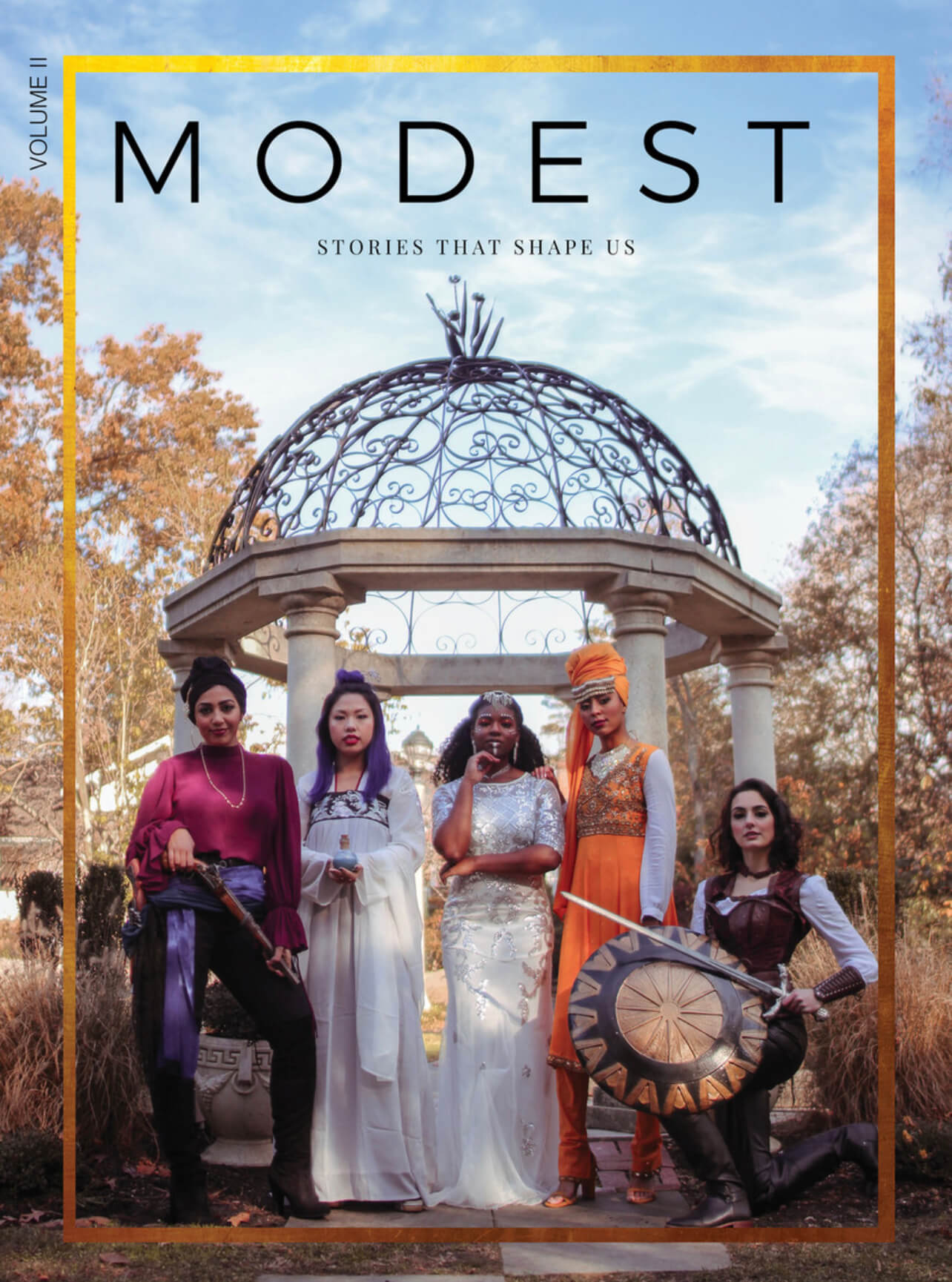
As so-founder and editor-in-chief of MODEST, an online publication that explores and redefines modesty, Akhtar is hoping to challenge stereotypes in female fashion. Source: Ifrah Akhtar
“I took my own advice and research tips that I presented to my parents, the resources I used while abroad, and some conversations I had with other Muslim students to form my guide for Muslims Abroad,” she explains to Rutgers Global. “This is a valuable resource because it’s that first step, the opening of the door or starting the conversation, when it comes to studying abroad.”
This guide covers topics such as how to talk to your parents, the benefits of studying abroad, halal food/delivery, prayer spaces, and funding options. While it’s not available online, she’s been able to share it with students at Rutgers. Below we talk to this inspiring graduate and K-boo on what life in South Korea was like and all the challenges in between:
Why did you choose Ewha University in South Korea?
I’ve always wanted to study abroad in South Korea, this stemmed from having a penpal from there since a young age. Ewha University was a great choice for me because it’s one of the most prestigious women’s colleges in the world. Although the summer programme I took part in was co-ed, I knew they had a strict policy against sexual harassment.
This was especially important for my parents, who feared for my safety abroad. The uni is also conveniently located in a great part of Seoul — right in the center of many shops, restaurants and near the subway.
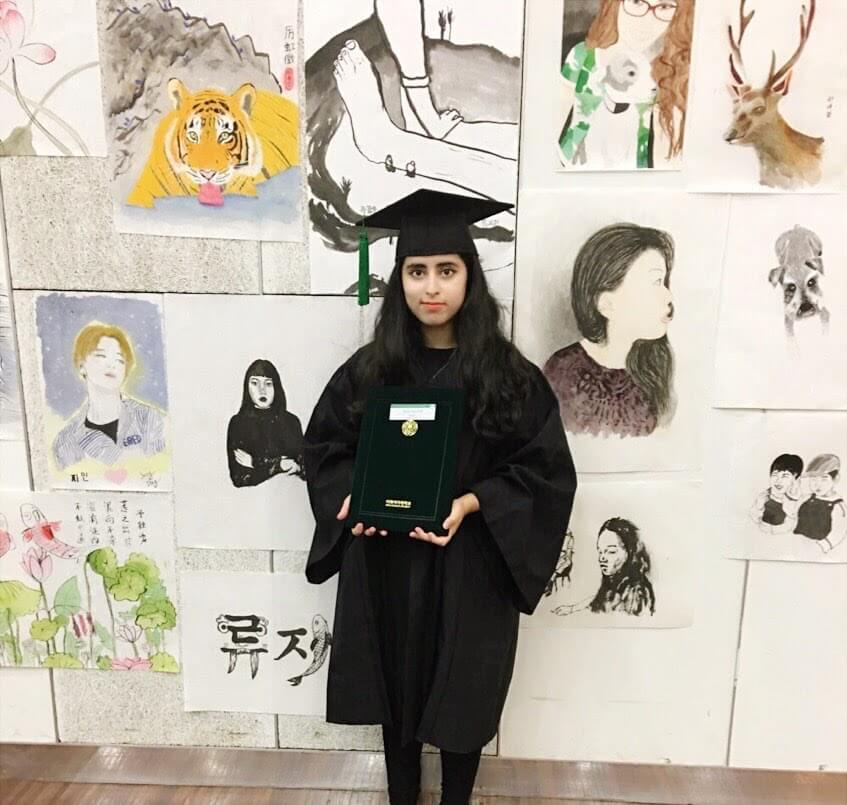
Graduation day for Akhtar at Ewha University. Source: Ifrah Akhtar
Do you think it would have made a difference if you had pursued your programme at a local institution?
Absolutely, studying abroad is valuable because it takes what you learn in class and brings it to life. This was especially important for my religion classes, learning about it in the classroom is great. However, through my experience abroad, I was able to go out in the world and interact.
I visited local shrines, churches, talked to practitioners, and even got a deeper understanding of my own faith through the eyes of a Muslim living in South Korea. This wouldn’t have been possible had I chosen to pursue the same curriculum at a local institution.
Tell us more about your career trajectory since graduating.
I graduated from uni only to go back to work there. I currently work as an administrative assistant with the Rutgers School of Health Professions. I only consider this as a little stop in my journey earning money, paying off student debt and planning for the next steps.
When I’m not doing the above, I work on developing and sharing the Muslims Abroad Guide I made as a Gilman Scholar.
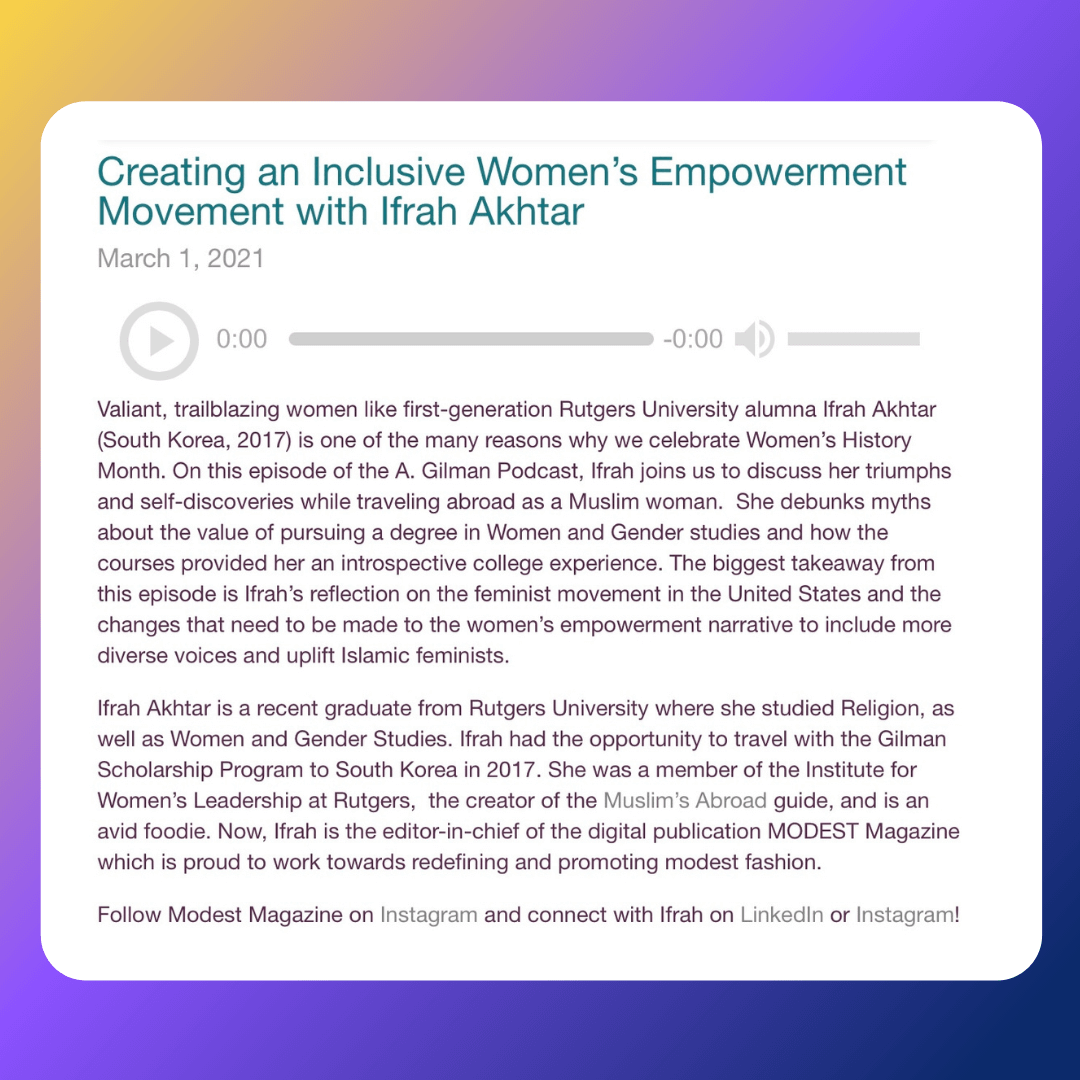
Ifrah Akhtar’s podcast with the Gilman Scholarship Programme. Source: Ifrah Akhtar
I’m taking time to educate myself on inequalities within the fashion industry, racial justice causes and environmental issues. When I’m not doing the above, I work on developing and sharing the Muslims Abroad Guide I made when I was a Gilman Scholar.
How do you use what you learn at uni in your current job role at Rutgers University and MODEST?
If someone was putting two and two together from what I studied to what I do, they’d be confused. Having a background in health, religion, literature, women’s and gender studies while working in fashion and lifestyle can be quite puzzling to some.
My undergraduate was extremely diverse because I have a penchant for learning and believing that everything connects in some way. The most valuable skills I absorbed during my coursework were how to analyse and understand systems, people and the media.
This ties to the work I do for MODEST. At first, this magazine started off with me trying to share a more authentic view of modest fashion, but now I want to challenge myself and others to unpack what modesty means.
What were the practical learning elements in your course? Do you get to apply them to your life now?
I learned the value of active listening, education gives us the tools to articulate but sometimes we forget to listen. This is especially seen in some study abroad narratives like how some people go to a “third-world country” with the intention of helping the population there — known as the “Savior Complex”. Just because we are educated about issues, doesn’t mean we have the right to determine solutions for other people.
A specific example from my experience abroad, was the first time I was exposed to Islam in the cultural context of South Korea. It’s a religion I grew up with, so I had different customs practicing it. So seeing it through a South Korean Muslim’s eyes gave me a whole new appreciation for it — a deeply spiritual and impactful revelation for me.
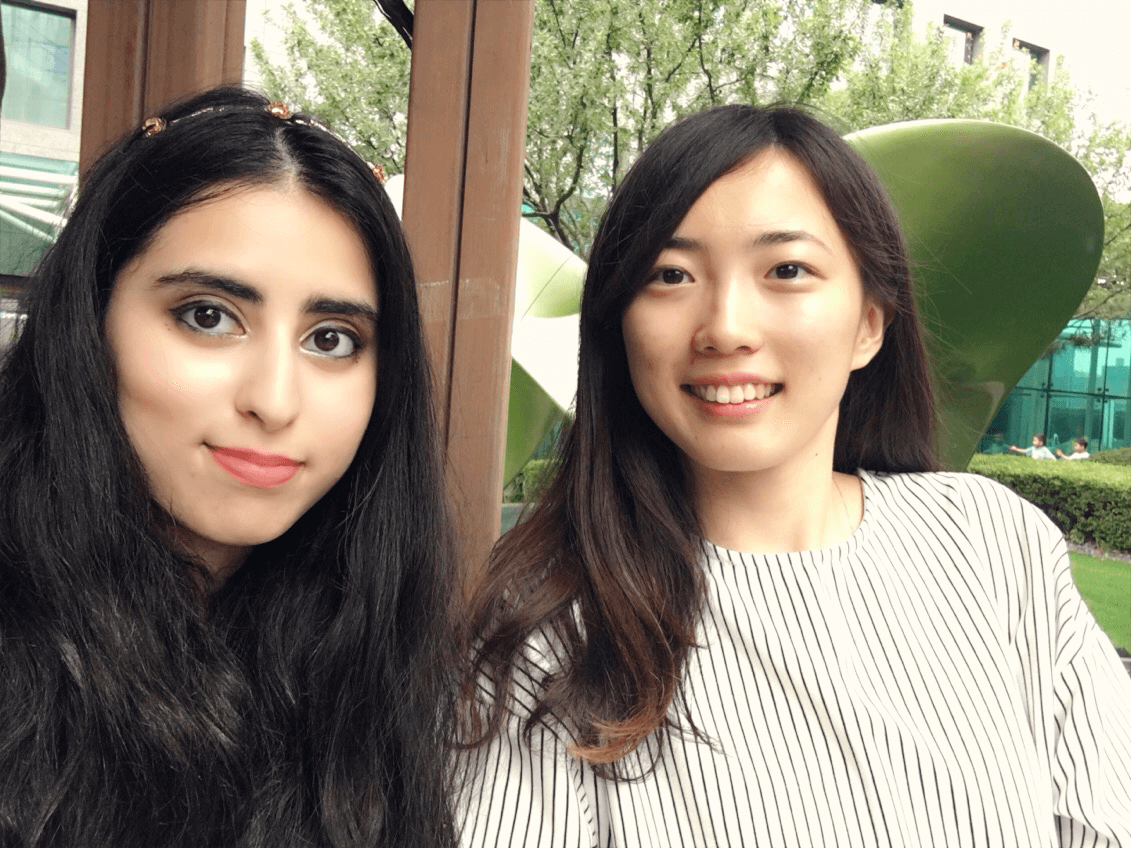
Akhtar and her penpal whom she finally got to meet and was the source of her inspiration to study in South Korea. Source: Ifrah Akhtar
What skills or knowledge do you wish you had learned more during uni?
I wish I learned more practical skills and how to take my education into the real world. If there was a mentorship programme, that would have been amazing. The uni experience can be an overload of information, so students aren’t really taught how to process and utilise it in the real world.
There should be more focus on study abroad experiences, so it’s not only known as being “amazing”. It took me a couple of years to really unpack everything and reflect on what I had learned from my undergraduate education.
What advice do you have for students who are planning to enrol in the same course as you did?
Try to connect with your professors more and try to get a mentor. I wish I spoke more with my professors, not just about classroom materials but about what led them to their fields too. Also try to read from different perspectives and be mindful of the authors writing the work you’re studying.
This is helpful to recognise if other voices have been left out. With regards to studying abroad, definitely talk to study abroad advisors, be honest with your obstacles and they will do their best to help you. If we follow up excuses with action, new worlds open up to us.
What do you think you could be done to further the inclusion of the Muslim community in countries abroad?
The best step would be education. If schools teach about different religious groups and their holidays, it would be a great step. I remember feeling left out when we would learn about Christmas and Hannukah in school, but no one would discuss Ramadan — the Muslim month of fasting.
There actually have been times when teachers and administrators have questioned my religious holidays when I needed to take time off for them. That ignorance is not okay, and therefore education is key here.
If there are unis with study abroad programmes, they should consider the needs of religious students. It can be very difficult to have to find food we can eat or spaces to pray if schools don’t offer them. This is even more challenging in a foreign country. With the Muslims Abroad Guide, it helps address these challenges and I’m working on disseminating it widely to uni study abroad offices.
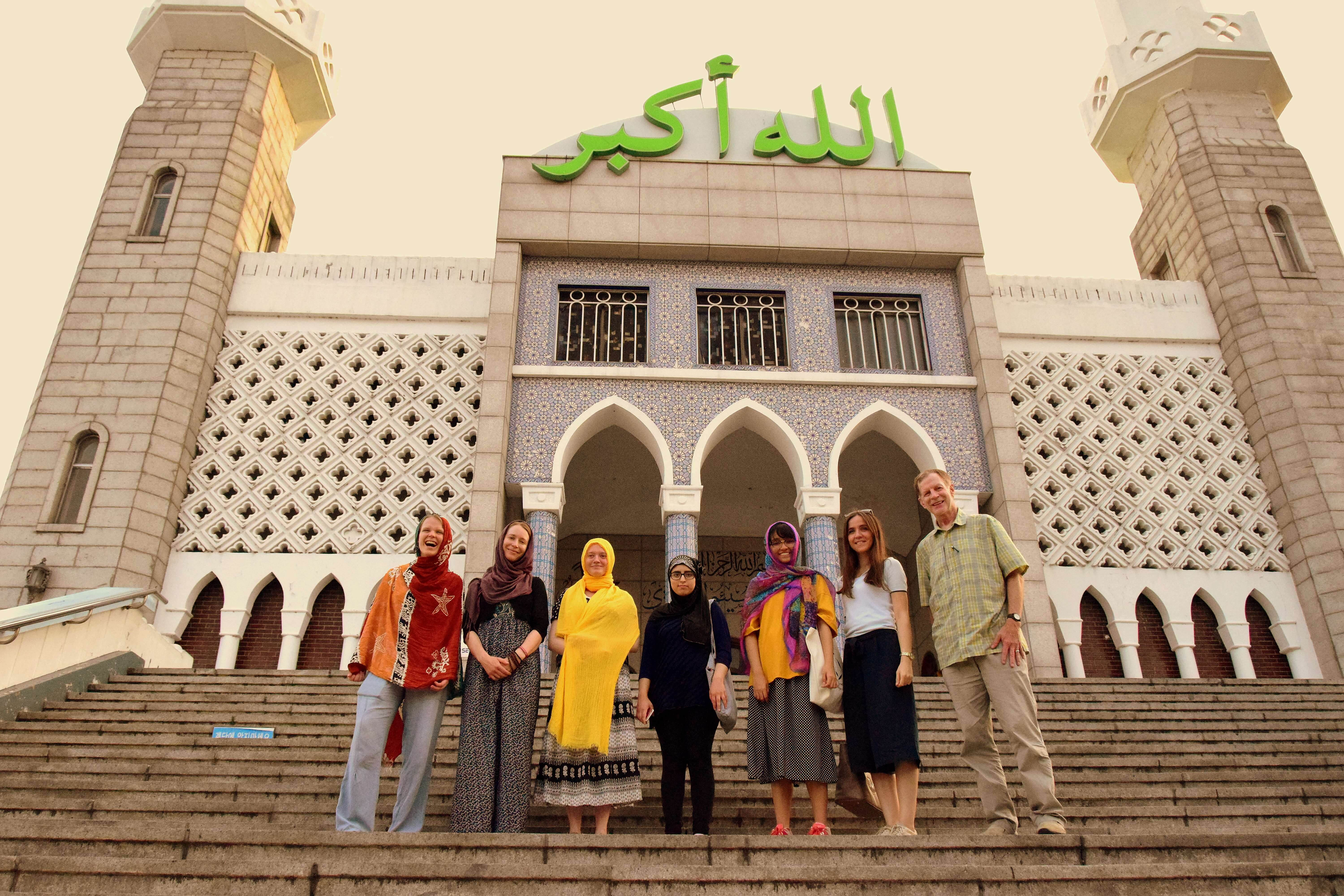
Akhtar outside a mosque in Seoul. Source: Ifrah Akhtar
What’s one thing you missed from home and how did you substitute it?
Honestly, I didn’t miss much other than my family and friends. Being in Seoul was everything I had ever hoped for and I wished I could have stayed longer. Although I did miss “samosas” (baked pastries with savoury fillings) and my mother’s “briyani”.
In turn, I discovered new and delicious Korean foods to fill those cravings. The fondest memory of my time there was when I met my penpal for the first time and we ate at a small restaurant. Even though we had never met before, our connection felt so effortless as we bonded over food.
Lastly, give us some fun facts about yourself.
I’m obsessed with learning food history and I judge restaurants based on their desserts. I read everything, but I have a guilty pleasure for reading children/young adult books — I think it’s because they break down complex ideas and I want to write some in the future. I played the viola in highschool but I had to take a break during college. I plan to get back to it though!





